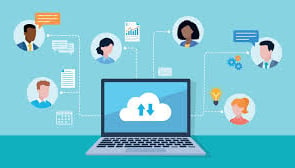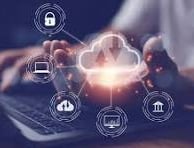Introduction
The rise of remote work has introduced new vulnerabilities in cybersecurity. Cloud-connected employee laptops are often the easiest way for cybercriminals to infiltrate an organization's network. From phishing attempts to physical theft, ensuring these devices are secure is paramount in today’s digital-first workplace.
Abstract
Overview
Employees working remotely are accessing critical business data on cloud-connected laptops. Unfortunately, this presents significant risks, such as theft, malware, or data breaches. Protecting these devices goes beyond traditional security protocols—it's essential for safeguarding your organization's entire network.
In the age of remote work, cloud employee laptops have become a key target for cybercriminals. Whether at home, a café, or while traveling, these devices are at constant risk. Let’s explore why safeguarding these laptops is crucial and how best practices can keep your organization’s data safe.


[Disclaimer: This blog post is for informational purposes only and should not be construed as legal or financial advice. Organizations should consult with legal counsel and regulatory authorities to ensure compliance with reporting requirements.]
Mandatory
Securing cloud employee laptops is no longer optional—it's a mandatory part of any comprehensive cybersecurity strategy. Implementing encryption, endpoint security, and multi-factor authentication (MFA) ensures that even when employees access data remotely, it's protected.
Applicability
Every organization with remote employees or a hybrid work model needs to protect cloud-connected laptops. This applies to all industries, especially those dealing with sensitive or confidential information, such as finance, healthcare, and government.
Regulatory or Company Interest?
Organizations are under increasing pressure to comply with regulations like GDPR, HIPAA, and PCI DSS, all of which demand robust endpoint security measures to protect sensitive data from remote access risks.
Key Guidelines
Implement robust password policies: Enforce strong passwords, multi-factor authentication, and regular password changes.
Keep software up-to-date: Regularly update operating systems, applications, and security software to prevent exploitation of known vulnerabilities.
Use anti-virus and anti-malware software: Install and regularly update anti-virus and anti-malware software to detect and prevent malware infections.
Use encryption: Encrypt sensitive data, both in transit and at rest, to prevent unauthorized access.
Implement a patch management program: Regularly patch vulnerabilities in software and applications to prevent exploitation.


Key Implications
Lack of proper security can result in data breaches, legal consequences, and reputational damage. Securing cloud employee laptops is an essential step in maintaining the integrity of your organization's cybersecurity framework.
Countries with Adoption or Influence
Countries with robust remote work policies, like the U.S., U.K., and Australia, have pioneered regulations ensuring endpoint security for cloud-connected devices.
International Frameworks Influenced
International frameworks such as ISO 27001 and NIST emphasize the importance of securing remote devices, aligning with the need for robust laptop security.
Regional and Industry-Specific Frameworks
In regions like the EU, frameworks like GDPR stress the protection of devices accessing personal data. Industries like finance and healthcare also have sector-specific requirements for securing remote work environments.
Secure Your Digital Identity with SecureKnots
Contact us to learn more about our cybersecurity services and ensure your organization meets cybersecurity requirements.


Conclusion
In today’s remote work environment, securing cloud employee laptops is not just a best practice—it's a necessity. With the rise in cyber threats targeting these devices, organizations must prioritize their protection through robust security measures like encryption, MFA, and endpoint security. By adopting these best practices, companies can safeguard their data and maintain business continuity, no matter where their employees are working. At SecureKnots, we specialize in providing the tools, training, and testing services necessary to protect your remote workforce and ensure your organization's cybersecurity posture remains strong. Let us help you stay one step ahead of cybercriminals and keep your business secure.
How SecureKnots Can Help
At SecureKnots, we provide a full range of services to secure your cloud-connected employee laptops. Through VAPT (Vulnerability Assessment and Penetration Testing), we identify weaknesses that could be exploited by cybercriminals. Our Security Awareness Training equips employees to recognize and avoid cyber threats, including phishing and malware. Additionally, our Ransomware Attack Simulations and Phishing Simulation services help you assess your security posture and ensure your remote workforce remains protected, no matter where they are working. Let SecureKnots ensure your cloud-connected laptops are safe from cybercriminals!
Thank you for your attention! If you have any inquiries about cybersecurity requirements or need expert guidance, please don't hesitate to contact SecureKnots.
This should wrap up the blog and fulfill the promise made in the previous one!
Cloud Employee Laptops
In today’s remote work world, cloud employee laptops are a primary target for cybercriminals. Employees may access your organization’s network from home, a café, or while traveling, leaving devices vulnerable to theft, malware, or hacking attempts. Protecting these laptops is essential to keeping your data safe, no matter where your employees are working.
WITH OUR SHORT BLOGS
STAY UP TO DATE
Copy Rights @ 2023 SecureKnots. All Rights Reserved.
CONTACT US
Contact@Secureknots.com
USA
+1-302-601-2346
+1-302-608-6708
INDIA
080-31658865
GET IN TOUCH
